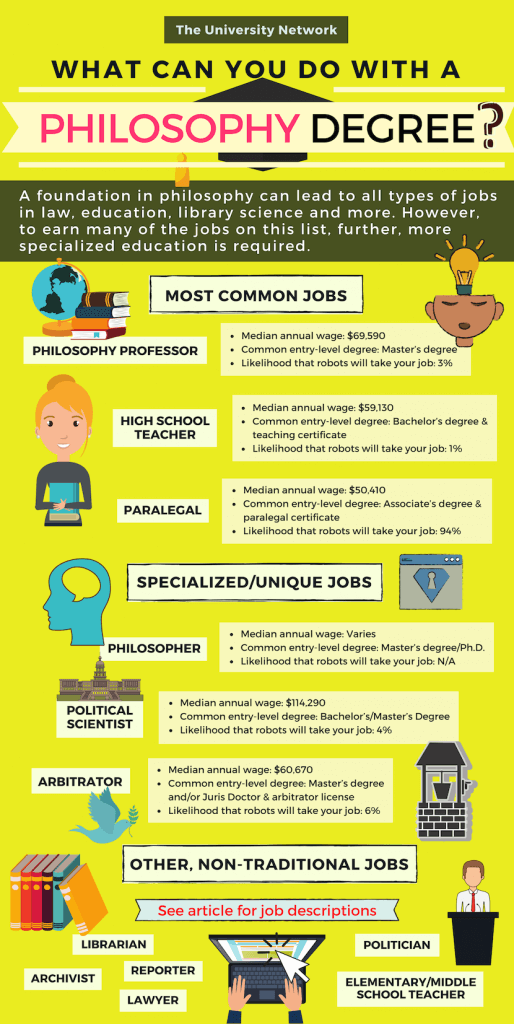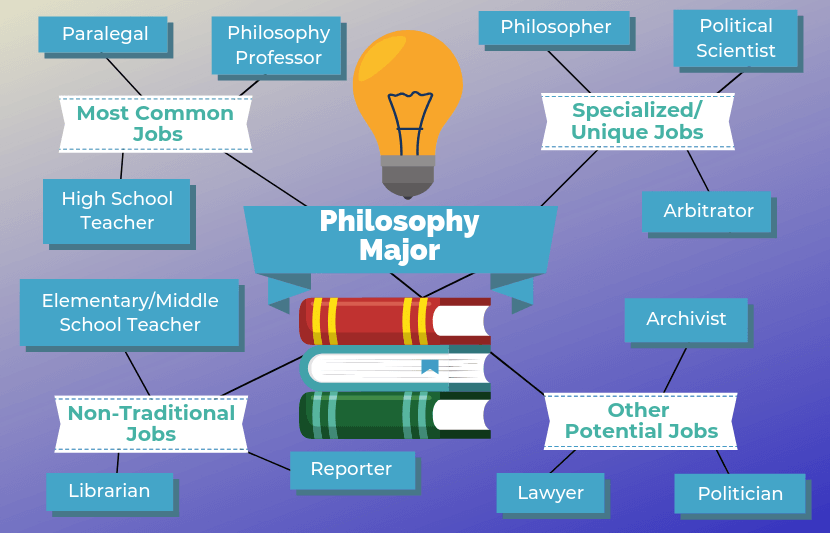By this point, philosophy majors are used to hearing they won’t get a job after college. But, in truth, job opportunities for philosophy majors aren’t so grim. While you may be hard-pressed to find a job with only a bachelor’s degree, a foundation in philosophy can lead to all types of jobs in law, education, library science and more. However, to earn many of the jobs on this list, further, more specialized education is required.
Here is a list of 12 possible jobs for philosophy majors:
Most Common Jobs for Philosophy Majors
1. Philosophy Professor
Philosophy majors are often most comfortable in the university setting, which makes post-secondary teaching a perfect job for them. Patience, communication, organization and enthusiasm are some of the most important characteristics of a good college professor. To earn a job teaching at the post-secondary level, a master’s degree (and sometimes a doctorate degree), is required. In addition to teaching, some college professors also conduct research and write scholarly articles.
Median annual wage: $69,590
Common entry-level degree: Master’s degree
Likelihood that robots will take your job: 3%
2. High School Teacher
To earn a job teaching in high schools, philosophy majors may have to seek further, more specialized education, as not every high school offers philosophy classes. However, philosophy majors generally also have a deep understanding of history, which is taught at nearly every high school. Those who aspire to teach in high school have to complete an internship in a school classroom, pass the state-required test for teachers and receive a teaching certificate/license.
Median annual wage: $59,130
Common entry-level degree: Bachelor’s degree & teaching certificate
Likelihood that robots will take your job: 1%
3. Paralegal
Philosophy, in many ways, is connected to law, so those who wish to pursue a career in the legal system occasionally study philosophy in undergraduate school. And before, or instead of, attending law school, some philosophy majors work as a paralegal. Typically, paralegals work at law firms and help lawyers by researching, drafting and organizing legal documents. They are also sometimes referred to as legal assistants. Aspiring paralegals need to have at least an associate’s degree and, in some cases, a paralegal certificate to earn a job.
Median annual wage: $50,410
Common entry-level degree: Associate’s degree & paralegal certificate
Likelihood that robots will take your job: 94%

Specialized, Unique Jobs for Philosophy Majors
4. Philosopher
The idea of being a philosopher isn’t quite as grand as it may have been in ancient Greece or Rome, but the world is still in need of great thinkers. While it can be extremely rewarding, philosophy is far from a 9-5 job, and paychecks aren’t guaranteed. But often times, modern-day philosophers work in academia, either teaching or archiving, to pay their bills. Typically, off the clock is when they do their thinking, writing and occasional publishing.
Median annual wage: Varies
Common entry-level degree: Master’s degree/Ph.D.
Likelihood that robots will take your job: N/A
5. Political Scientist
Political scientists’ day-to-day responsibilities vary depending on where they work. But more broadly, they analyze the origins and changes in political systems. They also can be tasked with developing political ideas and strategies, which can be passed on to politicians. Political scientists can work for the government, non-profits, think tanks and more. A master’s degree in political science, along with work experience through an internship or campaign, will open up the best job opportunities.
Median annual wage: $114,290
Common entry-level degree: Bachelor’s/Master’s Degree
Likelihood that robots will take your job: 4%
6. Arbitrator
Arbitrators help two opposing parties settle a dispute outside of court. The meetings that they are responsible for leading are often private, confidential and more laid back than a formal trial in court. While they aren’t always necessary, a master’s degree and/or a Juris Doctor degree will help aspiring arbitrators receive respected positions within their field. However, to receive an arbitrator license, some states require that you have a law degree. Additionally, arbitrators usually have an expertise, such as construction, labor or employment that might require further, more specific education. Professional arbitrators can be found and selected for services on the American Arbitration Association (AAA) website, among other places.
Median annual wage: $60,670
Common entry-level degree: Master’s degree and/or Juris Doctor & arbitrator license
Likelihood that robots will take your job: 6%
Non-Traditional Jobs for Philosophy Majors
7. Librarian
Due to philosophy majors’ close ties to academia, some of them go on to become librarians. Librarians may be responsible for curating the books, online databases and additional educational materials that make up a library. Librarians can work at various institutions, including schools, public libraries, museums, law firms, non-profit organizations and others. While it generally doesn’t matter what your undergraduate degree is in, many places won’t hire you as a librarian unless you have a master’s degree in library science.
Median annual wage: $58,520
Common entry-level degree: Master’s degree
Likelihood that robots will take your job: 65%
8. Reporter
Technically, there is no required degree to become a reporter, but you will have a hard time finding a job without one. Skilled reporters are master storytellers with strong writing and grammar skills. To learn the essential skills, most aspiring reporters study journalism in college. However, the researching, writing and critical thinking skills taught through philosophy easily translate to journalism and reporting.
Median annual wage: $40,910
Common entry-level degree: Bachelor’s degree
Likelihood that robots will take your job: 11%
9. Elementary/Middle School Teacher
After earning a bachelor’s degree, those who aspire to teach in elementary or middle schools have to complete an internship in a school classroom, pass the state-required test for teachers and receive a teaching certificate/license. If you are dead set on being a teacher, the best advice would be to major in education. But if you’re still uncertain about what you want to do, a degree in philosophy could ultimately help you land a teaching job.
Median annual wage: $57,350
Common entry-level degree: Bachelor’s degree & teaching certificate
Likelihood that robots will take your job: 0%
Other Potential Jobs for Philosophy Majors
10. Politician
Technically, anyone could consider themselves as a politician, but to have a legitimate career in politics, there are many preparatory steps. The first is developing an understanding of the Constitution and the governmental system. But after that, aspiring politicians will often have to network, volunteer on other people’s campaigns and develop their own political passions and strategies all before running for even small, local positions. Running for office takes time, money and commitment. But once you’ve earned a position and have developed a name for yourself, you can gradually start running for more prestigious roles in state and national government.
Median annual wage: Varies widely, depending on local, state or federal position
Common entry-level degree: Bachelor’s/Master’s degree & internship experience
Likelihood that robots will take your job: N/A
11. Lawyer
Philosophy and law are closely related, so many philosophy majors go on to become lawyers, but, to do so, completing a bachelor’s degree program is just the first step. If you want to become a lawyer, you will also have to pass the Law School Admissions Test (LSAT), apply to law school, earn a Juris Doctor degree and pass the Bar examination — all before you can begin to practice law. Generally, it takes 3 years to graduate from law school, so the entire process takes 7-8 years. If you’re interested in earning your master’s degree in philosophy while working towards your Juris Doctor degree, some universities, including New York University, offer joint programs.
Median annual wage: $119,250
Common entry-level degree: Juris Doctor degree
Likelihood that robots will take your job: 4%
12. Archivist
Archivist jobs are ideal for philosophy majors with a passion for history. The goal of the job is to collect, organize and protect various items that have historic value, including documents, photographs, videos, music, art and more. Archivists generally work for museums, government agencies or other entities that wish to keep extensive records. Generally, a bachelor’s degree is the only necessary certification to become an archivist.
Median annual wage: $51,760
Common entry-level degree: Bachelor’s degree
Likelihood that robots will take your job: 76%
10 Famous People Who Studied Philosophy
- Harrison Ford
- Ricky Gervais
- Phil Jackson
- Thomas Jefferson
- Bruce Lee
- Steve Martin
- Robert McNamara
- George Soros
- Alex Trebek
- David Foster Wallace
To explore options for other majors, click here.



